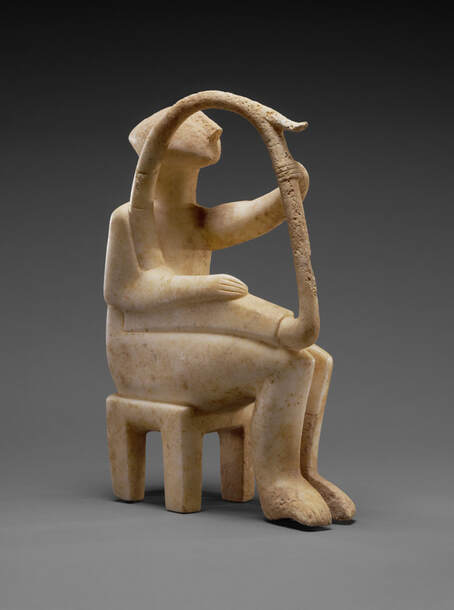|
Cycladic Harp Player (2700- 2300 BC): Three Views 1. To be so moved by a thing so still 2. Strolling through galleries, I refuse my friend's offer to take a photo for me with her phone of artwork I stand long in front of, looking, maybe writing, maybe sketching, as if I don't have a phone of my own, which I might as well not, I so rarely, in a gallery, take it out. It's not that I don't want a way to take it home with me, the art. I want it to become a part of me the way the arc of the harp frame seems to grow out of the player's arm just below the elbow the way the marble is hardly grooved to separate the sound box of the harp from the figure's thigh the way we say of virtuosi that their instruments are extensions of themselves. Still, I scan the gallery gift shops for postcards of the art that I've stood long in front of. I found one of this marble figure in the shop at the Getty Villa, that imagined replica I thought J. Paul had loved so much he'd had it disassembled and sent home from Herculaneum to Malibu. In fact, he loved what he hadn't seen so much he had architects design a new one for him, a mirror-image of the original whose 2000-year-old remains are still buried beneath what remains of the Vesuvian eruption. If I want an image later I will want it bigger than the little screen. I will want to hold it or lean it against a stack of files on my desk. A postcard gives me what I want, a language for my looking that I don't need to translate. Would I have accepted if I'd been invited to take the harp player home? Maybe, if I could imagine a place in my house where it could stand as if in a gallery, the air around it blank as its grey background on the card, nothing else in my field of vision. 3. No translation needed to recognize a feeling in the upward gaze of a pock-marked marble face with no features except the straight nose sloping smoothly from the forehead Wistful--longingly pensive, closely attentive—the word I find for the tilt of small head on long strong neck looking off with eyeless gaze to somewhere where the music of its stringless harp still echoes. Or maybe it's nostalgia, from the ancient Greek for a song of the ache to be home Even without ears—unless they're hidden by the harp's arch —the figure listens, a poet waiting for the song to come home to the poem Rebekah Wolman Rebekah Wolman is an erstwhile middle school principal based in San Francisco, California, on the unceded ancestral homeland of the Ramaytush Ohlone people. A 2021 winner of Cultural Daily's Jack Grapes Poetry Prize and the 2022 winner of the Small Orange Emerging Woman Poet Honor, she is even happier on a mountain trail than she is at her desk.
1 Comment
Jonathan Hollander
2/1/2024 06:36:43 pm
So many important thoughts contained in these seemingly simple lines (and, also, in the seemingly simple sculpture about which they are written.) So happy to find this! Thank you for posting it.
Reply
Your comment will be posted after it is approved.
Leave a Reply. |
The Ekphrastic Review
COOKIES/PRIVACY
This site uses cookies to deliver your best navigation experience this time and next. Continuing here means you consent to cookies. Thank you. Join us on Facebook:
July 2024
|




